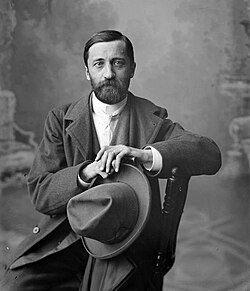Dmitry Merezhkovsky Quote
A thought expressed is a falsehood. In poetry what is not said and yet gleams through the beauty of the symbol, works more powerfully on the heart than that which is expressed in words. Symbolism makes the very style, the very artistic substance of poetry inspired, transparent, illuminated throughout like the delicate walls of an alabaster amphora in which a flame is ignited.Characters can also serve as symbols. Sancho Panza and Faust, Don Quixote and Hamlet, Don Juan and Falstaff, according to the words of Goethe, are schwankende Gestalten.Apparitions which haunt mankind, sometimes repeatedly from age to age, accompany mankind from generation to generation. It is impossible to communicate in any words whatsoever the idea of such symbolic characters, for words only define and restrict thought, but symbols express the unrestricted aspect of truth.Moreover we cannot be satisfied with a vulgar, photographic exactness of experimental photoqraphv. We demand and have premonition of, according to the allusions of Flaubert, Maupassant, Turgenev, Ibsen, new and as yet undisclosed worlds of impressionability. This thirst for the unexperienced, in pursuit of elusive nuances, of the dark and unconscious in our sensibility, is the characteristic feature of the coming ideal poetry. Earlier Baudelaire and Edgar Allan Poe said that the beautiful must somewhat amaze, must seem unexpected and extraordinary. French critics more or less successfully named this feature - impressionism.Such are the three major elements of the new art: a mystical content, symbols, and the expansion of artistic impressionability.No positivistic conclusions, no utilitarian computation, but only a creative faith in something infinite and immortal can ignite the soul of man, create heroes, martyrs and prophets... People have need of faith, they need inspiration, they crave a holy madness in their heroes and martyrs.(On The Reasons For The Decline And On The New Tendencies In Contemporary Literature)
A thought expressed is a falsehood. In poetry what is not said and yet gleams through the beauty of the symbol, works more powerfully on the heart than that which is expressed in words. Symbolism makes the very style, the very artistic substance of poetry inspired, transparent, illuminated throughout like the delicate walls of an alabaster amphora in which a flame is ignited.Characters can also serve as symbols. Sancho Panza and Faust, Don Quixote and Hamlet, Don Juan and Falstaff, according to the words of Goethe, are schwankende Gestalten.Apparitions which haunt mankind, sometimes repeatedly from age to age, accompany mankind from generation to generation. It is impossible to communicate in any words whatsoever the idea of such symbolic characters, for words only define and restrict thought, but symbols express the unrestricted aspect of truth.Moreover we cannot be satisfied with a vulgar, photographic exactness of experimental photoqraphv. We demand and have premonition of, according to the allusions of Flaubert, Maupassant, Turgenev, Ibsen, new and as yet undisclosed worlds of impressionability. This thirst for the unexperienced, in pursuit of elusive nuances, of the dark and unconscious in our sensibility, is the characteristic feature of the coming ideal poetry. Earlier Baudelaire and Edgar Allan Poe said that the beautiful must somewhat amaze, must seem unexpected and extraordinary. French critics more or less successfully named this feature - impressionism.Such are the three major elements of the new art: a mystical content, symbols, and the expansion of artistic impressionability.No positivistic conclusions, no utilitarian computation, but only a creative faith in something infinite and immortal can ignite the soul of man, create heroes, martyrs and prophets... People have need of faith, they need inspiration, they crave a holy madness in their heroes and martyrs.(On The Reasons For The Decline And On The New Tendencies In Contemporary Literature)
Related Quotes
Like symbolism, decadence puts forth the idea that the function of literature is to evoke impressions and 'correspondences', rather than to realistically depict the world. ... the decadent aestheticiz...
In this image (watching sensual murder through a peephole) Lorrain embodies the criminal delight of decadent art. The watcher who records the crimes (both the artist and consumer of art) is constructe...
About Dmitry Merezhkovsky
